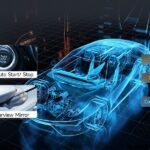Free car diagnostic in Los Angeles may seem too good to be true, but understanding where to find them and what they entail is key. CAR-TOOL.EDU.VN equips you with the knowledge to navigate the automotive repair landscape, ensuring you get the most value for your money. Explore options, compare services, and confidently make informed decisions for your vehicle’s health with our resource.
Contents
1. Understanding Car Diagnostics
Car diagnostics involves using specialized electronic equipment to identify issues within a vehicle’s various systems. These systems include the engine, transmission, exhaust, brakes, and more. Modern vehicles are equipped with an onboard computer known as the Engine Control Unit (ECU), which monitors the performance of these systems. When the ECU detects a problem, it stores a diagnostic trouble code (DTC) that can be accessed using a diagnostic scan tool.
1.1. The Role of the ECU
The ECU, as noted by Bosch in their “Automotive Handbook,” acts as the central processing unit for many of a car’s functions, including fuel injection, ignition timing, and emissions control. When a sensor detects an anomaly, such as a misfire or low oil pressure, the ECU registers a corresponding DTC. These codes are vital for mechanics to accurately diagnose the issue.
1.2. Types of Diagnostic Scan Tools
Diagnostic scan tools range from basic code readers to advanced, professional-grade equipment. Basic code readers can retrieve DTCs, while more sophisticated tools can provide live data, perform system tests, and even reprogram ECUs. According to a report by Grand View Research, the global automotive diagnostics market is expected to grow, driven by the increasing complexity of vehicle systems and the need for accurate and efficient diagnostics.
1.3. Common Diagnostic Trouble Codes (DTCs)
DTCs are standardized across the automotive industry, but their meaning can vary slightly depending on the vehicle make and model. Some common DTCs include:
- P0300: Random/Multiple Cylinder Misfire Detected
- P0171: System Too Lean (Bank 1)
- P0420: Catalyst System Efficiency Below Threshold (Bank 1)
- P0101: Mass Air Flow (MAF) Sensor Circuit Range/Performance Problem
These codes offer a starting point for diagnosis, but further investigation is often needed to pinpoint the exact cause of the problem.
